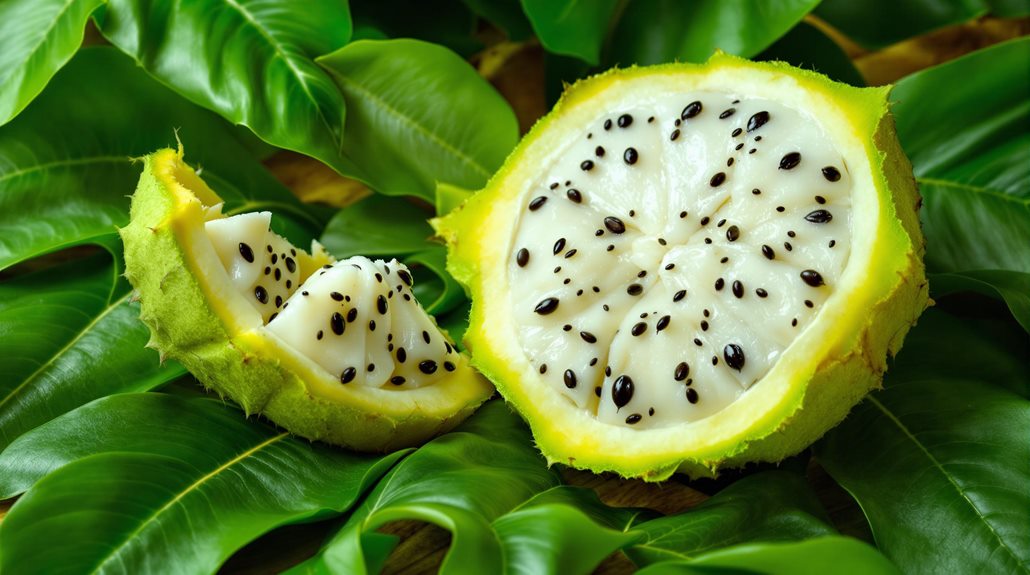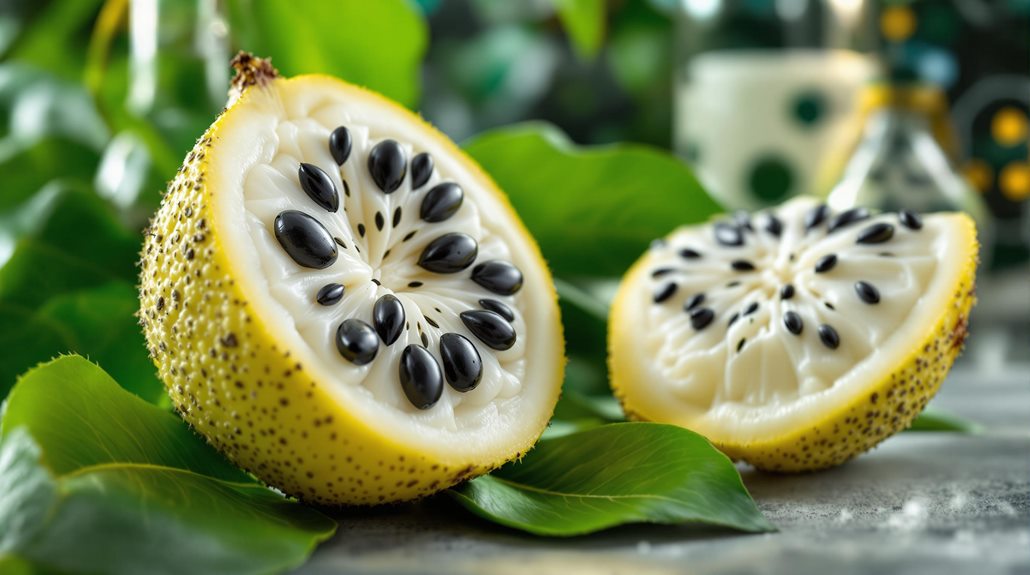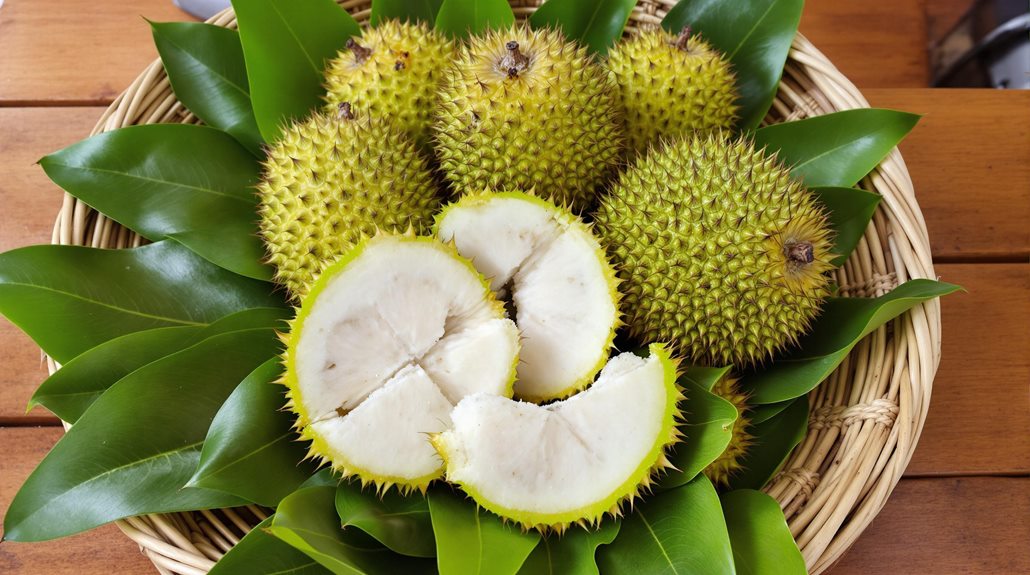Soursop Benefits Explained: A Guide to This Nutrient-Rich Superfruit

When you investigate soursop, you'll find it's a nutrient-rich superfruit with numerous health benefits. This tropical delight is low in calories but high in vital nutrients like vitamin C, offering 215% of your daily needs per 100 grams, which enhances your immune system. Its rich fiber content supports digestive health, while antioxidants can combat chronic diseases and inflammation. Soursop's high potassium helps regulate blood pressure, and its antibacterial properties improve oral health. Enjoy it fresh, in smoothies, or desserts, but remember to remove the seeds. There's much more to discover about this versatile and health-enhancing fruit!
Overview of Soursop
Soursop grabs your attention with its unique appearance and tantalizing flavor. Known scientifically as Annona muricata, this fruit hails from tropical regions of the Americas and boasts a distinctive prickly green exterior. Once you cut it open, you're greeted by its creamy white pulp, which offers a flavor blend of pineapple and strawberry. This exotic fruit isn't just a treat for your taste buds; it also packs a punch in terms of health benefits.
Rich in antioxidants like phytosterols and flavonoids, soursop helps combat oxidative stress, potentially reducing the risk of chronic diseases. Vitamin C is another standout in its nutrient profile, with a 100g serving delivering 215% of your daily needs. This high vitamin C content supports your immune system and promotes general well-being. Soursop's traditional use in folk medicine highlights its potential to improve digestive health, among other benefits.
Moreover, ongoing cancer research is investigating soursop's potential to fight cancer cells, sparking interest in its future applications. With its impressive array of nutrients and potential health benefits, soursop has earned its place as a revered superfruit in different cultures.
Nutritional Value
Packed with crucial nutrients, Annona muricata offers a low-calorie option for those mindful of their intake, providing just 66 calories per 100 grams. When you enjoy soursop, you're indulging in a fruit that's not only delicious but also packed with nutritional value. With 16.8 grams of carbohydrates per 100 grams, it provides an energy lift while still being a guilt-free choice.
Soursop is a powerhouse of dietary fiber, offering 3.3 grams per serving to help keep your digestive system on track. Its fiber content makes it a great option to incorporate into your diet for better gut health. Even more, soursop is an exceptional source of vitamin C, boasting 215% of your daily requirement in just one whole fruit. This high vitamin C content supports your immune function and promotes healthy skin.
Moreover, soursop is rich in potassium, supplying about one-third to one-half of your daily needs, crucial for regulating blood pressure. Its array of minerals and vitamins, including B vitamins and magnesium, improves its nutritional profile. Plus, the antioxidants like phytosterols and flavonoids in soursop combat oxidative stress, making it a truly advantageous inclusion in your diet.
Health Advantages

Often hailed for its impressive health benefits, this tropical fruit offers more than just a burst of flavor. Soursop is exceptionally high in vitamin C, providing an incredible 215% of your daily recommended intake in just one whole fruit. This abundance of vitamin C can greatly enhance your immune system, helping to reduce the duration of illnesses and keep you feeling your best.
Besides its immune-enhancing powers, soursop is a champion for healthy digestion. One serving contains 83% of your daily fiber needs, promoting regular bowel movements and preventing constipation. But that's not all—soursop is also rich in antioxidants, which play a crucial role in neutralizing free radicals and reducing the risk of chronic diseases like heart disease and cancer. Its potential anti-carcinogenic properties are remarkable, with research suggesting that soursop extracts may reduce tumor size and inhibit leukemia cell growth.
The health benefits of soursop extend to heart health, thanks to its high potassium content. This helps regulate blood pressure by easing tension in your blood vessels, potentially lowering the risk of hypertension. Furthermore, soursop consumption may help manage cholesterol levels, further supporting cardiovascular wellness.
Antioxidant Benefits
Brimming with powerful antioxidants, soursop offers a formidable defense against oxidative stress. This nutrient-rich superfruit is packed with compounds like phytosterols, tannins, and flavonoids, all working tirelessly to neutralize free radicals. By doing so, soursop helps protect your body's cells from oxidative stress, a key player in the development of chronic diseases.
One standout component of soursop is its impressive vitamin C content. Just one whole fruit provides a whopping 215% of your daily recommended intake. This enhances its antioxidant capacity, improving its ability to fend off harmful free radicals. Compounds such as luteolin, quercetin, and tangeretin further strengthen soursop's protective effects, reducing the risk of chronic diseases like heart disease.
Soursop extracts have shown promising results in test-tube studies, inhibiting free radical damage and displaying potential against conditions such as heart disease. While research is ongoing, these findings highlight soursop's role in health maintenance. Furthermore, its antioxidant properties may help reduce inflammation, supporting general well-being.
Incorporating soursop into your diet can be a delicious way to harness these benefits, safeguarding your health with nature's own protective powerhouse.
Anticancer Potential

Demonstrating notable anticancer potential, soursop extracts have shown cytotoxic effects against multiple cancer cell types, including breast, prostate, and lung cancer, in laboratory studies. You might be intrigued by the powerful anticancer properties of soursop extract, primarily attributed to annonaceous acetogenins (AGEs). These compounds inhibit specific enzymes found in cancer cell membranes, leading to a reduction in tumor size and the promotion of apoptosis, or programmed cell death, in cancer cells.
| Aspect | Detail |
|---|---|
| Cytotoxic Effects | Inhibits cancer cells |
| Annonaceous Acetogenins | Linked to anticancer properties |
| Apoptosis | Promotes cell death in tumors |
| Immune Activity | Improves body's defense against cancer |
Research also suggests that soursop might elevate your immune activity, helping your body fend off cancer cells, which adds to its potential health benefits. However, while these findings are promising, it is crucial to keep in mind that most of this evidence comes from lab and test-tube studies. Clinical research is still needed to confirm the efficacy and safety of soursop extract in human cancer treatment. Remember that while soursop's anticancer properties are exciting, they're just one aspect of this superfruit's potential health benefits.
Antibacterial Effects
Shifting focus from its anticancer potential, soursop also boasts significant antibacterial effects. This tropical fruit's antibacterial properties make it a promising candidate for improving oral health. It targets bacteria responsible for gum disease and cavities, potentially helping you maintain a healthier mouth. In traditional medicine, soursop has been valued for its infection prevention capabilities, and modern science is starting to catch up.
Test-tube studies reveal soursop extracts' effectiveness against harmful bacteria like those causing cholera and Staphylococcus infections. These findings suggest that soursop could be a natural ally in combating such bacteria, although further research is needed to determine its impact on humans. If these results hold true in human studies, soursop may offer a natural way to manage oral health issues like gingivitis and tooth decay.
While the potential is exciting, it's essential to keep in mind that further studies are required to confirm soursop's antibacterial effects and practical applications. The research may open doors for new, natural ways to promote oral health and prevent infections. Until then, incorporating soursop into your diet could provide some benefits, but it shouldn't replace traditional oral hygiene practices.
Safe Consumption Tips

When you're ready to enjoy soursop, it's crucial to confirm you're consuming it safely. Initially, always remove the seeds, as they contain toxic compounds that could pose health risks. Once that's done, consume fresh or frozen soursop within a few days of ripening to savor its full nutritional benefits and rich flavor. Keep in mind, moderation is key. Due to the fruit's high natural sugar content, it's wise to limit your intake to prevent digestive upset.
Before adding soursop to your diet, especially if you're taking medications for high blood pressure or diabetes, consult your healthcare provider. Soursop may interact with these treatments, so professional advice assures you're safely reaping its health benefits. Including soursop in your diet can be a delicious experience when done right.
Consider incorporating soursop into smoothies or desserts. This way, you can enjoy its unique taste while balancing its sweetness with other ingredients, making it a delightful part of a balanced diet. By following these tips, you can relish the benefits of soursop without compromising your health or well-being.
Culinary Uses
Soursop offers a multitude of culinary possibilities, making it a versatile improvement to your kitchen. With its creamy texture and sweet-tart flavor, soursop is perfect for both sweet and savory recipes. In tropical regions, it's a beloved ingredient in traditional desserts. You can enjoy it fresh, scooping out the creamy white pulp to blend into smoothies or add to desserts. The health benefits of this superfood make it a trendy choice in the current health-conscious recipes.
Incorporate soursop into your morning routine by using it as a flavorful topping for oatmeal. Its unique taste raises the dish while packing a nutritious punch. Alternatively, soursop's invigorating flavor makes it ideal for juices and cocktails, or for flavoring ice creams and popsicles. Immerse yourself in savory culinary uses by adding soursop to sauces, curries, and salads, where it brings an unexpected complexity.
Experimenting with soursop in your kitchen opens up a world of tropical flavor. Regardless of whether you're creating a new dessert masterpiece or a rejuvenating smoothie, this superfood adds not only delightful taste but also significant health benefits. Welcome soursop's versatility and let your culinary creativity shine.
Buying and Storing Tips

Purchasing ripe soursop is key to enjoying its unique flavor and health benefits. When selecting fresh soursop, focus on finding fruits that are slightly soft with a yellow-green hue, signaling perfect ripeness. Avoid any that have bruises, dark spots, or a foul odor, as these are signs of poor quality. You can typically find fresh or frozen soursop at Brazilian grocery stores or online, making it more accessible for adding to your diet.
Once you've got your fresh soursop, store the unripe ones on the counter at room temperature. As they ripen, move them to the refrigerator to preserve their freshness and enhance nutrient retention. It's best to consume refrigerated soursop within a few days. If you need longer storage, consider freezing soursop. This method not only retains its healthful nutrients but also allows you to easily incorporate it into smoothies, desserts, or even savory dishes whenever you're ready.




